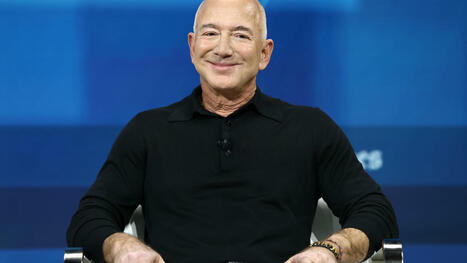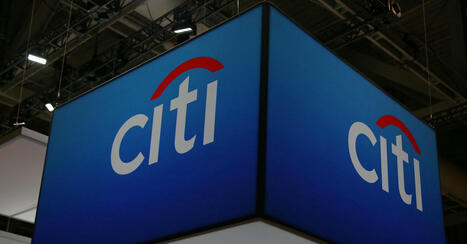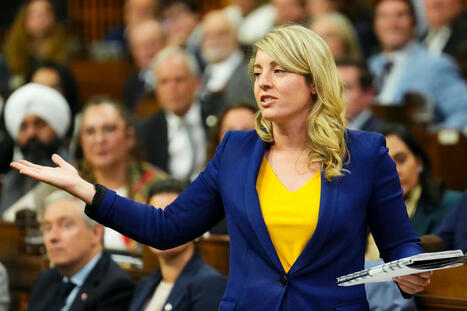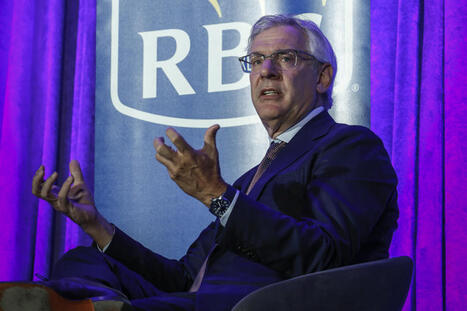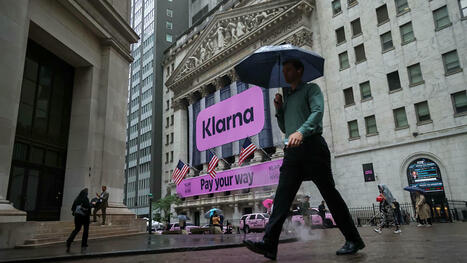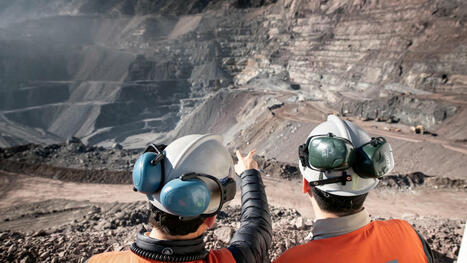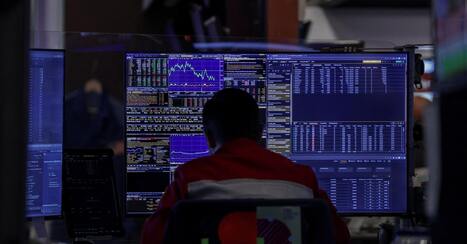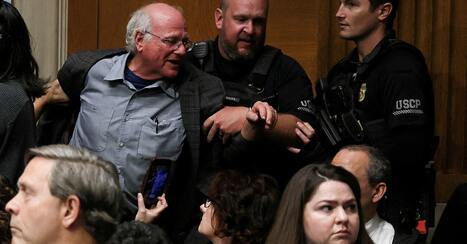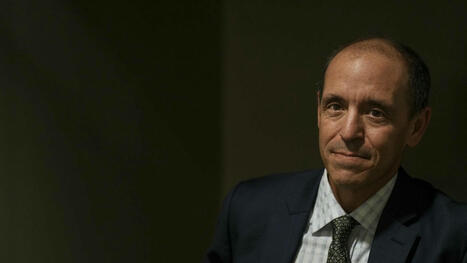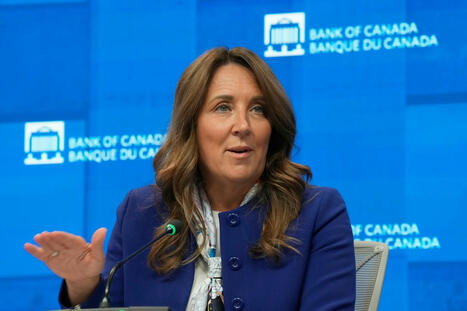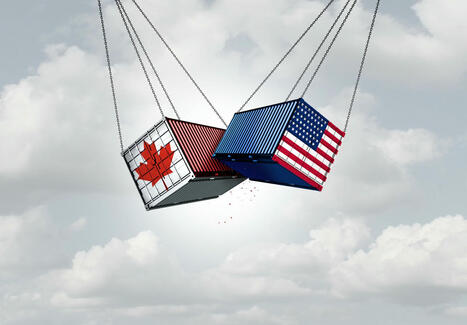 Your new post is loading...
 Your new post is loading...
Deal-making may have rebounded on Wall Street, but investment firms of the ultra-wealthy are still moving cautiously. Family offices made 54 direct investments in September, down 46% on an annual basis, according to data provided exclusively to CNBC by private wealth platform Fintrx. Despite the broader slowdown, billionaire family offices are still investing in mega-rounds for high-flying startups. Last month, the firms of Amazon founder Jeff Bezos and former Google CEO Eric Schmidt joined a $300 million seed round for Periodic Labs. Founded by former OpenAI and DeepMind researchers, Periodic Labs seeks to automate scientific research with artificial intelligence-powered robots running lab experiments.
Israel and the Palestinian militant group Hamas signed an agreement on Thursday to cease fire and free Israeli hostages in exchange for Palestinian prisoners, in the first phase of U.S. President Donald Trump’s initiative to end the war in Gaza. Israelis and Palestinians alike rejoiced after the deal was announced, the biggest step yet taken to end two years of war in which over 67,000 Palestinians have been killed, and return the last hostages seized by Hamas in the attacks that unleashed it. Officials on both sides confirmed they had signed the deal following indirect talks in the Egyptian beach resort of Sharm el-Sheikh. Under the deal fighting will cease, Israel will partially withdraw from Gaza and Hamas will free all remaining hostages it captured in the attack that precipitated the war, in exchange for hundreds of prisoners held by Israel.
PepsiCo reported declining sales volumes in its two biggest businesses and announced the departure of its chief financial officer after less than two years, as the food and beverage company engages with activist investor Elliott Management. The maker of Pepsi and Doritos said organic sales volumes fell 4 per cent at both its North American food and beverage businesses in the third quarter, underscoring how higher prices and health concerns were turning away some consumers. Struggles in PepsiCo’s North American businesses have caught the attention of Elliott, which last month disclosed a $4bn stake and offered extensive recommendations for turning the business around. The campaign is intensifying pressure on chief executive Ramon Laguarta to boost sales that have slowed in the past two years. On Thursday, PepsiCo also announced that finance chief Jamie Caulfield would retire next month after less than two years in the job. He will be replaced on November 10 by Steve Schmitt, finance chief at the US division of Walmart, PepsiCo’s largest customer.
Citigroup on Thursday rejected Mexican mining and transport conglomerate Grupo Mexico's bid for its retail unit in the country, known as Banamex, opting instead to push forward with a previously agreed-upon deal. Grupo Mexico surprised last week when it made an unsolicited $9.3 billion offer for Banamex, more than two years after it had backed away from negotiations. The news rocked local markets, wiping off billions in the firm's market capitalization. Shares in Grupo Mexico climbed more than 4.5% on Citi's statement Thursday that it rejected the bid. Citi last month announced that it would sell a 25% stake in Banamex to Mexican billionaire Fernando Chico Pardo, chairman of airport operator ASUR for around $2.3 billion. The lender then planned to hold a public offering for the rest of the unit, it said at the time, while also gauging the interest of other local magnates. Citi on Thursday said that it believed that deal was the best option to divest from Banamex responsibly and maximize value for shareholders.
When Tesla directors offered Elon Musk the biggest executive pay package in corporate history in September, it reassured investors that he would have to achieve the equivalent of “Mars-shot milestones” to earn $878 billion in Tesla stock over 10 years. The board’s proposal said Musk would have to “completely transform Tesla and society as we know it” in robotics and autonomous driving as well as stock value and profits. Conversely, Musk would get “zero” unless he meets those “incredibly ambitious” goals. Yet Musk could reap tens of billions of dollars without meeting most of those targets, according to a Reuters analysis of his performance goals and more than a dozen experts in executive pay, company valuations, robotics and automotive trends including autonomous driving. He could collect more than $50 billion by hitting a handful of the board’s easier goals that won’t necessarily revolutionize Tesla’s products or business, the Reuters review found.
Franco-Nevada, a Canadian company that invests in gold mines in exchange for their royalties or a portion of their output, plans to expand its business in Australia, CEO Paul Brink said on Thursday. Brink said Franco-Nevada has recently made two hires in the resource-rich state of Western Australia and would like to find some junior goldmine developers to back. “The reason that we are hiring is our plan is to focus more on Australia,” he told a mining event in Melbourne. Australia is one of the world’s largest producers of gold. The commodity is set to become the country’s second most valuable resource export this financial year after prices surged to record highs. Brink said U.S. President Donald Trump’s policies had been critical to the current rally. Gold surged past the US$4,000 an ounce level for the first time on Wednesday and is up 54 per cent year-to-date.
Innovation Minister Mélanie Joly is promising a new industrial era for Canada, with a three-point strategy to protect jobs, create new employment and attract talent and investment in the face of economic threats from the United States. In an interview with The Globe and Mail Wednesday, Ms. Joly said the country’s auto, steel, aluminum, copper and lumber sectors are under siege from U.S. President Donald Trump’s trade war. The government needs to aggressively respond to the Trump tariff shocks with a detailed plan to transform the Canadian economy through targeted investments, fast approvals of major projects and harnessing Ottawa’s purchasing power, she said. “Like every single country on Earth that is affected by the decisions of the American country, we need to be able to come up with a new vision on how we will deal with our own economy,” Ms. Joly said. “It’s not a wait-and-see approach. This is a Canadian moment we need to seize.”
Le président et chef de la direction de la plus grande banque du pays affirme que le Canada doit devenir moins réticent au risque pour prospérer face aux bouleversements du commerce mondial. Le président et chef de la direction de la Banque Royale du Canada, Dave McKay, constate que les gouvernements fédéral, provinciaux et municipaux « ont peur de commettre des erreurs », ce qui allonge les délais d’approbation des projets et décourage les entreprises d’investir. « Le temps coûte de l’argent. L’incertitude coûte de l’argent. Il est donc très difficile pour notre pays d’avancer avec confiance et rapidité, et le reste du monde le ressent », a-t-il déclaré mercredi devant la Chambre de commerce de Calgary. M. McKay a ajouté qu’il y avait eu plusieurs faux départs dans le cadre de nouveaux projets d’infrastructure majeurs, ce qui a dissuadé les entreprises d’investir des capitaux.
Even as the IPO market is starting to rebound, startups are staying private for longer thanks in large part to alternative capital, according to new data. The median age of companies that have gone private so far this year is 13 years since founding, up from a median of 10 years in 2018, according to new data from Renaissance Capital. A separate, recent study by Jay Ritter at the University of Florida found that between 1980 and 2024, the average age of companies going public has more than doubled. Companies going public also have much larger revenue, since they’re maturing longer in private hands. In 1980, the median revenue for IPO companies was $16 million, or $64 million in inflation-adjusted 2024 dollars. By 2024, their median revenue had soared to $218 million, according to Ritter’s study. The number of so-called “unicorns,” or private companies with valuations of more than $1 billion, has swelled to over 1,200 as of July, according to CB Insights. OpenAI’s valuation of $500 billion, notched with last week’s sale of employee shares topped SpaceX’s $400 billion valuation to become the world’s most highly valued private company.
Anglo American has defended the due diligence on its $50bn merger with Teck Resources after the Canadian company slashed production forecasts at two large copper mines. The Vancouver-based miner said on Wednesday that its flagship Quebrada Blanca facility in Chile would produce 170,000-190,000 tonnes of copper this year, down from a previous guidance of up to 230,000 tonnes, and cut forecasts for the site up to 2028. This is the second cut to guidance at the giant copper asset this year, after an earlier downgrade related to waste disposal issues. Quebrada Blanca was seen as a key reason for the merger with Anglo announced last month, as it is only a short distance from the London-listed company’s Collahuasi mine. Executives and analysts have long considered the potential of combining the two assets, though Quebrada Blanca has been hit by repeated setbacks that have hit Teck’s share price over the past 12 months.
Acadia Healthcare said on Tuesday it has appointed Todd Young as chief financial officer, amid growing pressure from activist investors to improve performance and governance. Young takes over on October 27 from Tim Sides, who had served as interim CFO since August and will return to his role as senior vice president of operations finance. Young joins Acadia from Elanco Animal Health where he served as CFO since 2018, helping shape the company's strategy following its separation from Eli Lilly. The appointment at Acadia comes as it faces calls for strategic changes from two of its largest shareholders — Khrom Capital and Engine Capital — which together own more than 8% of the company. Khrom Capital, which owns a 5.5% stake in Acadia, has called for a strategic review including a potential sale earlier this month, citing long-term underperformance and governance issues. Late last month, Engine Capital, which owns about 3%, called for operational changes, asset sales, and a board overhaul.
A Los Angeles jury ordered Johnson & Johnson to pay US$966 million to the family of a woman who died from mesothelioma, finding the company liable in the latest trial alleging its talc products cause cancer. The family of Mae Moore, a California resident who died at age 88 in 2021, sued the company the same year, claiming J&J’s talc baby powder products contained asbestos fibers that caused her rare cancer. The jury late on Monday ordered J&J to pay $16 million in compensatory damages and $950 million in punitive damages, according to court filings. The verdict could be reduced on appeal as the U.S. Supreme Court has found that punitive damages should generally be no more than nine times compensatory damages. Erik Haas, Johnson & Johnson’s worldwide vice president of litigation, said in a statement that the company plans to immediately appeal, calling the verdict “egregious and unconstitutional.”
Food group Nestle said on Wednesday it had withdrawn from a global alliance for cutting methane emissions that aims to reduce the impact of dairy farming on global warming. The Dairy Methane Action Alliance was launched in December 2023, with members, which include Danone, Kraft Heinz and Starbucks, committing to publicly measure and disclose methane emissions from their dairy supply chains and publish plans to reduce those emissions over time. Nestle did not say why it was pulling out of the alliance but said it would continue working towards reducing greenhouse gas emissions, including methane, throughout its supply chains and was sticking to its net zero commitment by 2050. The move is the latest blow to a corporate alliance seeking to limit the impact of global warming, and comes as U.S. President Donald Trump dismantles a range of climate protection initiatives. Several major banks, for example, have left the sector’s main group leading efforts to cut carbon emissions.
|
The steep rally in Wall Street stocks is sparking worries among investors of a bubble forming, which could lead to a significant correction. Optimism over the prospects of artificial intelligence has lifted the valuations of several technology heavyweights including Nvidia, Microsoft and most recently, Oracle. This has propelled benchmark S&P 500 Nasdaq and the Dow to new heights this year. S&P 500 and the Nasdaq hit fresh record highs on Thursday and are up about 15% and 19%, respectively. The Dow has gained about 10% year-to-date. The rise in U.S. equities has attracted a series of warnings about the likelihood of an impending correction. International Monetary Fund chief Kristalina Georgieva warned on Wednesday about the risks to the world economy from potentially large corrections in lofty stock markets. JPMorgan Chase CEO Jamie Dimon also warned of a heightened risk of a significant correction in the U.S. stock market within the next six months to two years, the BBC reported.
La Corée du Nord devrait présenter jeudi ses derniers missiles de pointe lors d’un grand défilé militaire célébrant le 80e anniversaire du parti communiste au pouvoir, en présence de hauts responsables chinois et russes. Le dirigeant nord-coréen Kim Jong-un avait lui-même assisté le 3 septembre, aux côtés des présidents chinois Xi Jinping et russe Vladimir Poutine à une gigantesque parade militaire célébrant à Pékin la victoire contre le Japon et la fin de la Seconde Guerre mondiale il y a 80 ans. Le premier ministre chinois Li Qiang dirigera une délégation chinoise en Corée du Nord pour participer aux célébrations jeudi, tandis que le vice-président du Conseil de sécurité russe Dmitri Medvedev se rendra également à Pyongyang. La Russie et la Corée du Nord ont resserré leurs liens depuis le début de la guerre en Ukraine, où Pyongyang a envoyé des milliers de soldats combattre aux côtés des forces russes.
Novo Nordisk said on Thursday it would buy U.S.-based Akero Therapeutics for up to $5.2 billion to gain access to a promising liver disease drug candidate, in the first major deal by the Danish drugmaker’s new CEO to spur growth. Mike Doustdar, who took the helm at the Wegovy maker in July, has signaled a focus on new, highly effective obesity and diabetes drugs that can also treat related cardiometabolic conditions such as MASH, rather than expanding into other areas. Akero’s drug candidate, efruxifermin, is currently in late-stage trials for treating metabolic dysfunction-associated steatohepatitis (MASH). “We view this deal, coupled with recent internal restructuring at Novo, positively as Doustdar works to bring the ship back on course,” said BMO Capital analyst Evan Seigerman. Under Doustdar, tasked with stemming market share losses to U.S. rival Eli Lilly, the company last month said it would cut 9,000 jobs.
Ice cream brand Ben & Jerry's is set to switch corporate owners next month, but for Ben Cohen, the counterculture brand's co-founder, it is a case of meet the new boss, same as the old boss.
As of November, Ben & Jerry's will be owned by Magnum Ice Cream Co when Magnum is officially spun out from its current parent, London-based Unilever. Cohen expects the simmering conflict between Ben & Jerry's and Unilever to continue as he carries on a quest to try to buy back the brand he co-founded in 1978. Cohen said Magnum is censoring Ben & Jerry's ability to speak out on progressive causes like Palestinian rights and U.S. immigration. The brand last year claimed in a lawsuit that Unilever had violated a hands-off policy it had agreed to under which it acknowledged the ice cream maker's independent board and its responsibility for its social mission. "There is no difference between how Unilever is muzzling Ben & Jerry's and Magnum," Cohen told Reuters in an interview, saying the same executives are demonstrating a similar "muzzling prowess." Magnum said in a statement that it has had discussions on only about 2% of the brand's social media posts over the years.
OpenAI’s chief global affairs officer Chris Lehane grew up in Maine, where he recalls there was no shortage of trees. They got chopped into lumber, shipped around the world and then turned into furniture that was often sold back to Mainers for several times more than the trees had cost in the first place. There’s a version of that scenario that could play out in Canada with artificial intelligence and Lehane thinks now is the moment to stop it. “The real challenge for Canada and the opportunity, really, is can it harness its advantages, and make sure that they’re translating into economic development here in Canada?” he said in an interview during a visit to Canada this week. “AI should not just be ‘We’re going to build data centres and ship the power to other parts of the world.”’ His comments came on the sidelines of the Toronto tech conference Elevate, a day after he met with AI Minister Evan Solomon, who has promised the country’s first strategy around the technology by the end of the year. How bold, sovereign and hospitable it winds up being to foreign tech giants like OpenAI, the U.S.-based maker of chatbot ChatGPT, is still up in the air.
The Bank of Canada on Thursday warned against imposing more regulations on the financial sector, instead urging measures to encourage competition and innovation that it said could help offset U.S. tariffs. “As the world heads into a period of greater economic nationalism and more industrial policy, we need to resist the urge to add protections,” Senior Deputy Governor Carolyn Rogers said in Toronto. Greater contestability, more new entrants and more innovation in the financial sector would lead to competition that was good for consumers, for productivity and for our economy, she said, adding: “We should lean into it.” Rogers has consistently stressed the need to improve Canada’s sluggish productivity, arguing this would help insulate the economy against the threat of inflation. Canada’s banking sector is highly concentrated, with just six banks collectively holding 93 per cent of all banking assets. Many argue that this level of concentration has clear negative impacts on productivity, innovation, capital allocation, cost and consumer choice, Rogers added.
Il n’y a pas d’unanimité dans les rangs libéraux concernant la résurrection éventuelle du projet de pipeline Keystone XL entre le Canada et les États-Unis, mais les conservateurs se réjouissent du retour de ce projet potentiel. Le premier ministre Mark Carney a discuté d’un intérêt pour le projet mardi à la Maison-Blanche avec le président américain, Donald Trump, qui s’est montré « très réceptif ». Le Parti conservateur (PCC) a soutenu pour sa part jeudi que ce n’est ni un gain ni une concession pour le Canada dans les négociations avec le voisin américain : Donald Trump avait déjà appuyé le projet, mais il avait été sabordé par l’administration Biden dès son arrivée au pouvoir en janvier 2021. Des élus libéraux ont réagi avec prudence en se rendant à leur caucus hebdomadaire mercredi. Le député et ancien ministre Marc Miller s’est permis de soulever certains doutes. « Il me semble qu’il faudrait que [le projet] soit viable », a-t-il répondu en mêlée de presse mercredi matin.
Le premier ministre Mark Carney revient à Ottawa mercredi sans aucun accord visant à supprimer les droits de douane américains sur les produits canadiens. Il laisse toutefois deux de ses ministres clés sur place pour continuer à défendre la cause du Canada. Mark Carney a rencontré le président américain Donald Trump dans le bureau Ovale mardi après-midi. Il s’agissait de la deuxième rencontre de ce type entre les deux dirigeants en moins de six mois. Avant cette rencontre, Donald Trump a dit aux journalistes que Mark Carney allait repartir « très heureux », mais qu’il ne montrait aucun signe de relâchement sur la question des droits de douane et qu’aucun accord n’avait été annoncé. Le ministre responsable du Commerce Canada–États-Unis, Dominic LeBlanc, a déclaré aux journalistes lors d’une conférence de presse suivant la réunion que des progrès substantiels avaient été réalisés et qu’il existait désormais une dynamique favorable à la conclusion d’accords, qui n’existait pas avant mardi.
SoftBank Group on Monday said it had agreed to buy the robotics division of Swiss engineering firm ABB for $5.4 billion, as the Japanese giant looks to bolster its artificial intelligence plays. The deal, which is subject to regulatory approval globally, means ABB will no longer look to spin off its robotics business as a separately listed company. “SoftBank’s next frontier is Physical AI. Together with ABB Robotics, we will unite world-class technology and talent under our shared vision to fuse Artificial Super Intelligence and robotics — driving a groundbreaking evolution that will propel humanity forward,” Masayoshi Son, founder of SoftBank, said in a statement. Artificial Super Intelligence, or ASI, is Son’s idea of AI that is 10,000 times smarter than humans. Son has looked to position SoftBank at the center of the potential AI boom through investments and acquisitions in different areas of technology. SoftBank owns chip designer Arm, for example, and has a major stake in OpenAI. SoftBank already has some robot-related investments, including AutoStore Holdings and Agile Robots.
Recruiters for directors at top U.S. companies are going back to basics, new data shows, as boards seek experienced hands to tackle challenges like artificial intelligence and President Donald Trump's tariffs. The trends also diminish boards' one-time focus on bringing in younger directors and those from more diverse backgrounds. This year, incoming directors at S&P 500 companies averaged 59.1 years old, continuing years of increasing ages, according to an annual review, opens new tab set for release on Tuesday by executive search and leadership advisory firm Spencer Stuart. Moreover, 30% of new directors are active or retired CEOs, and 29% have a financial background - both figures unchanged from 2024. "We're going back to people saying they would really like CEO experience in the room," said Julie Hembrock Daum, chair of Spencer Stuart's North American Board Advisory Practice. "Most companies would like an active CEO on the board if they could, but that's harder and harder to come by," because of policies by big investors barring public company CEOs from having too many outside commitments.
Peter Hargreaves, the billionaire co-founder of Hargreaves Lansdown, is stepping down as a board director of the UK’s largest “DIY” investment site, months after its £5.4bn acquisition by private equity firms. Hargreaves, 79, who set up the personal investment business from a spare bedroom with Stephen Lansdown in 1981, will hand his board position to his son, Robert. The company said Hargreaves rejoined the board earlier this year to “provide continuity” following its sale to CVC Capital Partners, Nordic Capital and an arm of Abu Dhabi Investment Authority in a deal that was struck last year and completed in March. The move marks a symbolic end to Hargreaves’ involvement in the investment site, although he continues to hold a stake in the business. The company said Hargreaves “will maintain a close relationship” and “has offered to make his insight and experience available if needed”.
Prime Minister Mark Carney returns to Ottawa today without any deals to remove U.S. tariffs from Canadian goods, but he is leaving two of his key ministers behind to keep pressing Canada’s case. Carney met with U.S. President Donald Trump in the Oval Office on Tuesday afternoon, the second such meeting between the two leaders in less than six months. Trump told reporters ahead of that meeting that Carney was going to walk away “very happy” but showed no signs of relenting on tariffs and no deal was announced. Canada-U.S. Trade Minister Dominic LeBlanc told reporters at a press conference following the meeting that substantial progress was made and there is now momentum to make deals that wasn’t there before Tuesday. He said Carney and Trump directed their teams to move quickly on sector-specific trade deals beginning with steel, aluminum and energy.
|






 Your new post is loading...
Your new post is loading...
